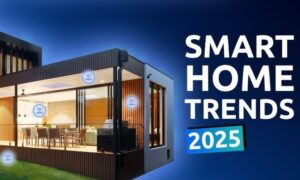Automated garage doors have gone from a luxury feature to an essential part of modern homes. They bring convenience, added security, and a sleek touch to homes. With technology advancing every year, garage doors are no longer just an entry point; they’re becoming an integral part of our smart homes.
This article dives into the evolution of automated garage doors, the technologies that power them, and their benefits. We’ll also cover costs, the installation process, troubleshooting common issues, and what lies ahead for these innovative home additions.
Introduction to Automated Garage Doors
Automated garage doors have come a long way since their inception. Initially, they were basic systems that responded to simple remotes. However, as smart home technology advanced, so did the demand for more intelligent and adaptable garage door automation. Today, homeowners look for convenience, security, and seamless integration with the rest of their homes, and automated garage doors check all these boxes.
In many neighborhoods across the United States, automated garage doors are becoming the norm. For homeowners in bustling urban areas like Dallas, Texas, installing automated garage doors is a way to enhance security and add a touch of convenience. Local providers like Metro Garage Door Repair are popular choices for homeowners looking to upgrade or repair their systems.
Technological Advancements in Automation
The journey of automated garage doors has been marked by significant technological milestones. Today’s systems are far more advanced and customizable than early versions, offering enhanced safety, user control, and integration capabilities. Some of the most impactful advancements include:
- Sensors and Motion Detection: Sensors are integral to modern automated garage doors. They can detect motion or obstructions, ensuring that the door won’t close if someone or something is in the way. This adds a critical layer of garage door safety by preventing accidents. Temperature and humidity sensors are also becoming common, allowing garages to maintain climate control and protect stored items.
- Remote Controls and Smartphone Apps: Gone are the days when garage door remotes were only key fobs clipped to your sun visor. Today, remote controls can be managed through smartphone apps, letting homeowners open, close, or lock their garages from anywhere. Some smart garage systems integrate with home assistants like Amazon Alexa or Google Home, allowing voice control for a hands-free experience.
- Smart Door Integration and Wi-Fi Connectivity: Wi-Fi-enabled home automation doors are designed to integrate with other smart devices and systems. Homeowners can monitor and control their garage doors through smart home platforms, enabling features like automated opening and closing schedules and integration with home security systems. Many models also provide real-time notifications, so you always know if your garage door is open or closed.
- Advanced Security Features: Security is a top priority for many homeowners, and automated garage doors often come with features like rolling code technology. This system changes the access code every time you open or close the door, making it harder for unauthorized people to gain access.
These technologies are making high tech doors not only more functional but also safer and more secure.
Benefits of Automated Garage Doors
Upgrading to an automated garage door brings a wide range of benefits that enhance daily living:
- Enhanced Security: One of the primary advantages of automated garage doors is improved security. Many systems come with advanced encryption or rolling codes, so access codes are constantly changing, reducing the risk of break-ins. You can also receive alerts if there’s any unusual activity, providing peace of mind.
- Convenience: Whether you’re inside your home, sitting in your car, or on vacation, you can control your garage door with the tap of a button or through voice commands. Remote garage doors add unparalleled convenience, letting you monitor or control access from anywhere. For instance, if a family member or friend needs access to the garage, you can open it for them remotely.
- Energy Efficiency and Climate Control: Automated doors with insulation can help regulate temperature within the garage, especially useful in areas with extreme weather conditions. By keeping the garage at a moderate temperature, these doors can help reduce overall energy usage in the home, especially if there’s a room above the garage.
- Safety for Family and Pets: Motion sensors and auto-reverse mechanisms prevent the door from closing if there’s an obstacle in its path, ensuring that children, pets, and belongings remain safe.
- Higher Property Value: Automated systems are increasingly seen as a desirable home feature, making properties with them more appealing to potential buyers. For homeowners looking to add value to their homes, an automated garage door can be an attractive selling point.
- Smart Integration: Many homeowners integrate their garage door tech with other smart devices, allowing their garage door to play a role in the overall home automation setup.
Installation Process Explained
If you’re considering upgrading to an automated garage door, here’s a look at the typical installation process:
- Initial Consultation: A technician will start by assessing your existing setup and recommending the best options based on your door’s weight, size, and other structural factors. They’ll also check your electrical system to ensure compatibility with the motor and other components.
- Removing the Old Door: If you’re upgrading from a manual door, the technician will remove the old system carefully, taking any necessary precautions to avoid damaging the garage’s structure.
- Installing the New Door and Motor: The new door, along with the motor and other hardware, is installed. This includes fitting tracks, springs, and the motor that will control the door’s movement. Proper installation is crucial to ensure a smooth and quiet operation.
- Wiring and Sensor Installation: Safety sensors are installed on both sides of the garage to detect any movement. The wiring is connected to ensure that the door responds correctly to commands from the remote, smartphone, or smart home system.
- Programming and Testing: The final step is programming the door to respond to remotes, apps, or voice commands. The technician will conduct thorough tests to ensure that everything works correctly and that the door opens and closes smoothly and safely.
Hiring a professional, such as Metro Garage Door Repair in Dallas, ensures a quick, hassle-free installation. For homeowners looking for garage door companies in Dallas, Metro Garage Door Repair offers reliable and efficient services, making the installation process seamless.
Comparing Costs: Manual vs. Automated
One of the biggest questions homeowners face when considering an upgrade is cost. Here’s a breakdown of the expenses involved with manual versus automated garage doors:
- Initial Costs: Automated garage doors generally cost more upfront due to the additional components and technology involved. However, prices have dropped over the years, and more affordable options are available for budget-conscious homeowners.
- Maintenance Costs: Automated doors may require more maintenance, such as software updates or sensor adjustments, but these are usually minor and infrequent.
- Energy Savings and Longevity: Automated doors with insulation can lead to long-term energy savings. Their robust build and technology can reduce wear and tear, helping them last longer and thus saving on replacement costs.
Though automated doors are more expensive initially, their long-term value in terms of convenience, security, and energy savings often makes them a worthwhile investment.
Common Challenges and Troubleshooting
Like any piece of technology, automated garage doors can experience occasional issues. Here are some common challenges and quick fixes:
- Power Outages: Since automated garage doors rely on electricity, they won’t operate during a power outage unless equipped with a battery backup. If your area experiences frequent outages, consider investing in a model with this feature.
- Sensor Issues: Sometimes, the sensors may get blocked or misaligned, preventing the door from closing. Cleaning the sensors and adjusting their alignment can usually resolve this.
- Remote Malfunctions: Remotes can sometimes lose connectivity or run out of battery. Check for battery issues first, and consider switching to a smartphone app as a backup.
- Unusual Noises: If the door becomes noisy, it may be due to a lack of lubrication or worn parts. Regular maintenance can help prevent these issues.
Maintenance Tips for Automated Garage Doors
Maintaining an automated garage door is essential for long-lasting performance. Here are some practical tips:
- Regular Lubrication: Apply lubricant to all moving parts, including hinges, springs, and rollers. This helps reduce friction, minimizes noise, and extends the lifespan of the components.
- Inspect the Sensors: Clean the sensors regularly to ensure they function correctly. Dust and dirt can interfere with their ability to detect obstacles.
- Check the Door Balance: To test balance, disconnect the door from the motor and manually open it halfway. If it stays in place, the balance is correct. If not, consult a professional, as an unbalanced door can damage the motor.
Consistent maintenance helps prevent costly repairs, ensuring your automated garage door runs smoothly for years.
The Role of Smart Home Integration
For homeowners looking to create a fully connected home, garage door automation can play a key role in overall smart garage systems. When integrated into a smart home ecosystem, automated garage doors can:
- Lock down automatically when you leave or set the alarm
- Open or close based on your smartphone’s location
- Send alerts to your phone when opened or closed unexpectedly
Smart integration also allows you to monitor the garage from anywhere, adding an extra layer of security and convenience. This functionality is ideal for homeowners who want a seamless blend of tech and everyday convenience.
Future Trends in Garage Door Automation
As we look to the future, several exciting trends are expected to redefine garage door technology:
- AI-Powered Doors: Artificial intelligence could soon enable garage doors to “learn” user habits, making adjustments automatically to improve efficiency or energy savings.
- Advanced Voice Recognition: Voice control may become more sophisticated, allowing more customization and integration with other smart home functions.
- Increased Sustainability: Expect to see doors made from eco-friendly materials and equipped with energy-saving features. The focus on sustainability will make these doors even more appealing for homeowners.
Conclusion: Embracing Automation in Home Design
Automated garage doors represent more than just a convenience; they’re a modern upgrade that aligns with the future of home technology. For homeowners who prioritize safety, energy efficiency, and smart technology, these doors offer an impressive balance of function and design. As technology continues to evolve, there’s no better time to explore this high-tech upgrade.
For those interested in learning more, there are reputable garage door companies in Dallas like Metro Garage Door Repair ready to assist with installations, repairs, and maintenance.
Frequently Asked Questions (FAQ)
- What are the primary differences between a manual and automated garage door?
Automated doors operate with remotes, apps, or voice commands, while manual doors require physical effort to open and close.
- How much does it cost to install an automated garage door?
Costs vary depending on the door’s size, type, and features, but automated doors are generally more expensive upfront than manual ones.
- What maintenance is required for automated garage doors?
Maintenance includes regular lubrication, cleaning sensors, and checking for balance. These steps help ensure long-term performance.
- Will an automated garage door work during a power outage?
Some automated doors come with a battery backup, allowing them to operate during outages. If this feature is important, look for models that include it.
For further guidance, check out Metro Garage Door Repair’s website to explore available options for garage door companies in Dallas that offer top-tier service.



































